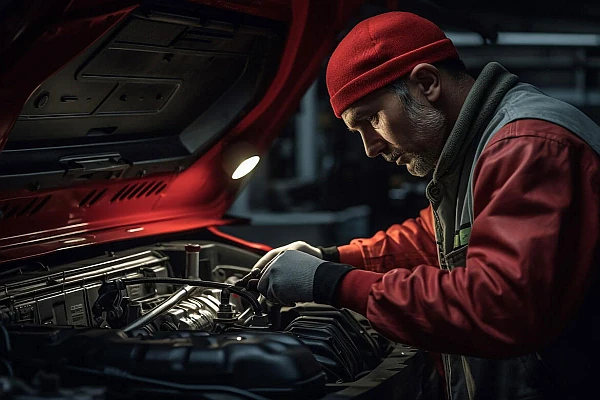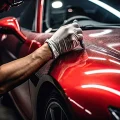Simple Car Components You Should Know
Your car’s engine block contains precisely machined cylinders where controlled explosions happen. The cylinder head has intake and exhaust valves that control airflow to ensure optimal combustion. The cooling system, with the radiator and water pump, keeps the engine at the right temperature to prevent overheating.
Core components you should know about:
- Engine Management: Fuel injection system, spark plugs, and throttle body control your engine’s performance
- Power Components: Battery stores energy, alternator generates electricity, and starter motor initiates engine operation
- Safety Systems: Anti-lock braking system, brake calipers, and oxygen sensors ensure safe operation
Warning Signs That Need Your Attention Right Away
Your vehicle tells you about potential problems through specific signals. The check engine light lights up to show issues from minor sensor malfunctions to serious engine problems. The oil pressure warning light just needs immediate attention—driving with this warning could damage your engine beyond repair.
Look out for these vital warning signs:
- Dashboard Alerts: Oil pressure, battery, and temperature warning lights point to urgent issues
- Unusual Sounds: Grinding or squealing noises, especially during braking, suggest worn components
- Performance Changes: Sudden changes in handling, acceleration, or fuel efficiency mean you need professional inspection
DIY Fixes vs. Calling a Mechanic
Knowing what you can fix yourself versus what needs professional help prevents costly mistakes. You can safely do simple maintenance tasks like changing windshield wipers or adding fluids at home. Complex issues with the engine, transmission, or electrical systems need professional expertise.
You can handle these maintenance tasks:
- Checking and maintaining proper fluid levels
- Inspecting tire pressure and tread depth
- Replacing air filters
- Monitoring battery connections
Some situations need professional help. Your car might show multiple warning lights, make strange sounds, or show signs of mechanical failure. That’s when expert help becomes vital. Professional mechanics have specialized tools and diagnostic equipment they need for complex repairs.
Trying complicated repairs without proper knowledge leads to bigger and pricier problems. If you face unfamiliar issues or don’t have proper tools, consulting a qualified mechanic at an auto repair service in Manhattan makes the most sense.
How to Find a Trustworthy Auto Repair Shop in NYC
Finding reliable auto repair services in Manhattan takes more than a quick online search. A newer study shows that 38% of vehicle owners ask friends and family for recommendations when choosing a repair shop. You need a detailed verification process to make the right choice.
Verification Methods Beyond Online Reviews
The New York State Department of Motor Vehicles sets strict standards for auto repair shops. Look for the green and white “Registered State of New York Motor Vehicle Repair Shop” sign outside the shop. The shop should also display a valid DMV registration certificate inside.
These vital verification points matter beyond simple registration:
- ASE (Automotive Service Excellence) certification of technicians
- Better Business Bureau rating and complaint history
- Length of business operation in the community
- Physical inspection of facility cleanliness and setup
Questions to Ask Before Committing to a Repair Shop
The right questions help you find trustworthy mechanics. A reliable Manhattan auto repair service should give detailed answers about their expertise and processes openly. Here are the questions you need to ask:
- What range of experience do your technicians possess with my specific vehicle make?
- Can you provide a detailed, written estimate breaking down parts and labor costs?
- Will you notify me if repair costs exceed the estimate by more than 10%?
- What warranty do you offer on parts and labor?
The Repair Shop Act gives you the right to ask for written estimates for parts and labor costs. Shops must also get your permission before doing any work beyond what you agreed to.
Red Flags That Signal a Dishonest Mechanic
Knowing warning signs protects you from unethical practices. A big red flag appears when mechanics won’t show you damaged parts or explain repairs in simple terms.
These warning signs should concern you:
- Reluctance to provide written estimates or detailed invoices
- Pressure tactics pushing for immediate repairs
- Unwillingness to return replaced parts upon request
- Resistance to showing problem areas in person
- Cash-only payment policies
Good shops are transparent and offer multiple payment options. They keep detailed service records and give solid warranties for their work. Most quality shops offer at least a 12-month, 12,000-mile warranty on repairs.
Note that a shop’s appearance and staff interactions tell you a lot. Quality service often comes from well-organized shops with friendly, professional staff. Watch how they treat other customers and whether the atmosphere feels rushed or calm. The right auto repair service in Manhattan depends on full verification, clear communication, and attention to these important details.
Decoding Your Manhattan Auto Repair Bill
Auto repair bills from Manhattan auto shops need careful attention to detail. Recent data shows smaller vehicles cost substantially less to maintain. Mid-size cars are 41% more expensive [link_1] to service than small cars. Large SUVs need 138% higher maintenance costs compared to their smaller counterparts.
Standard Pricing for Common Repairs in NYC
Manhattan’s auto repair costs are typically 3.24% above the national average. A complete breakdown shows water pump replacements cost approximately $1,388, which is 9.34% higher than the national average.
Common repair prices in Manhattan include:
- Synthetic oil changes: $150-163
- Brake pad replacements: $294-524
- Cabin filter replacements: $36-39
- NYS Inspection: $37
Hidden Fees to Watch out for
Your invoice might surprise you with additional charges from auto repair shops. These hidden fees show up near the bottom, usually next to the sales tax amount. Look for charges labeled as:
- Sundry Supplies Fee: Covers simple materials like nuts, bolts, and cleaning supplies
- Hazardous Waste Disposal Fee: Shops often profit from selling waste oil to refiners, despite charging for disposal
- Environmental Impact Fee: Usually calculated as a percentage of your total bill
- Shop Supply Charges: Range from 5% to 10% of your total repair cost
New York State law requires repair shops to provide detailed invoices that list each repair, parts replaced, and their costs. The invoice must also clearly state whether installed parts are new, used, or both.
How to Dispute Questionable Charges
Start by resolving issues directly with shop management if you face disputed charges. Here are the key steps to follow:
- Document Everything: Keep copies of estimates, invoices, work orders, and all shop communication
- Review Your Rights: New York State law mandates written estimates upon request
- File Complaints Properly: Submit disputes to the DMV within 90 days or 3,000 miles of the repair
- Credit Card Protection: Credit card users have 60 days to dispute charges under the Fair Credit Billing Act
The DMV’s Vehicle Safety Consumer Services Section handles repair disputes through mediation and resolves about half of all complaints. Failed mediation cases move to investigation by a DMV regional office.
Note that you can pursue legal action independently, even though the DMV helps secure restitution for overcharges or poor-quality repairs. However, you cannot get double recovery through both DMV mediation and court proceedings.
DIY Car Maintenance Tips for Manhattan Drivers
Manhattan drivers can save substantial repair costs by doing simple maintenance checks. Recent data shows that only 19% of drivers regularly check their vehicles before trips. These quick inspections could prevent repairs from getting pricey.
Simple Checks before Visiting a Repair Shop
Your vehicle’s unusual noises, vibrations, or performance changes need evaluation first. Share detailed notes about these issues with your mechanic. Your dashboard warning lights supply valuable information about your car’s condition.
Essential pre-visit checks include:
- Checking all fluid levels, including oil, coolant, and brake fluid
- Testing exterior and interior lights, wipers, and antennas
- Looking at brakes and steering system for irregularities
- Recording odometer readings and fuel gage levels
Maintenance Tasks You Can Safely Perform Yourself
Your vehicle’s lifespan increases with regular DIY maintenance and reduces repair costs. Studies show that drivers who understand simple maintenance spend 40% less on annual repairs. Cold tire pressure checks should happen monthly.
Key DIY tasks for Manhattan drivers:
- Monitor tire pressure and tread depth using a quality gage
- Check battery terminals for corrosion and clean with hot water
- Replace windshield wipers every 6-12 months
- Top off washer fluid with freeze-resistant solution
Essential Tools for Urban Car Owners
Manhattan drivers need a simple toolkit for routine maintenance. A quality socket set forms the foundations for DIY repairs, among other significant tools that enable basic maintenance tasks.
Must-have tools include:
- Tire pressure gage for regular monitoring
- Basic socket and wrench set
- Portable jump starter for emergency situations
- Multi-tool set for minor adjustments
Of course, having these tools matters, but understanding their proper use is vital. To cite an instance, see manufacturer specifications when using a torque wrench to prevent over-tightening or under-tightening bolts. Your tools should stay in secure yet available compartments to prevent damage during normal driving conditions.
Note that some maintenance tasks need professional help. Tasks with brakes, transmission, or complex electrical systems require expert knowledge. Knowing when to do DIY maintenance versus seeking professional auto repair services Manhattan will give a safe and long-lasting vehicle.
Conclusion
Smart navigation of Manhattan’s auto repair world demands expertise and the right service partners. Car owners need to understand common scams, simple car components, and proper maintenance to make smart decisions about their vehicle’s care.
Regular maintenance checks and a clear understanding of repair costs protect your investment effectively. Smart decisions about DIY tasks versus professional repairs can save valuable time and money.
Your car’s lifespan depends on consistent upkeep and reliable mechanics. Marty’s Auto Body Services stands ready to provide professional, transparent, and quality repairs in Manhattan. A well-maintained vehicle lasts longer and gives you peace of mind on New York’s busy streets.















